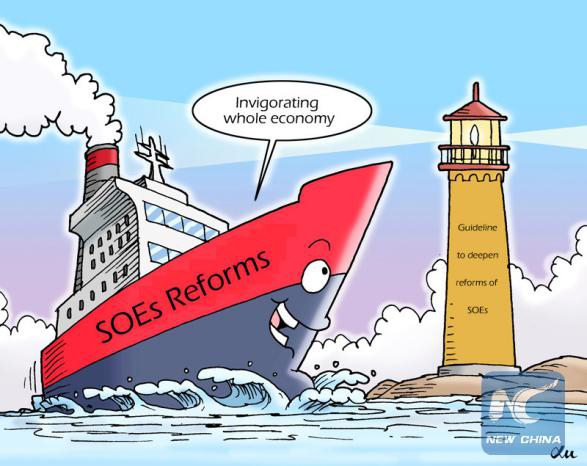By Tom McGregor, CCTV.com Panview commentator and editor
Editor's note: 2018 marks the 40th anniversary of China's 'reform and opening up' that opened the doors for a more prosperous China that helped hundreds of millions of Chinese citizens escape poverty as the nation had enjoyed rapid economic growth and development. CCTV.com takes a closer look at Beijing's comprehensive reforms with a series of special reports focusing on various fields where tremendous changes have taken place ever since the introduction of the policy.
At the start of China's reform and opening up introduced by Chinese leader Deng Xiaoping at the Third Plenary Sessions of the 11th Central Committee of the Communist Party of China (CPC) with a declaration of an "open door" policy, one of the key strategies was to implement reforms of the nation's state-owned enterprises (SOEs).
The reforms revolved around delivering dramatic policy changes to state-owned enterprises (SOEs), so that they were no longer reliant on taxpayers funding just to keep operating, since generating profits would spur expansion with added investments. And if the SOE did not succeed, they were expected to go bankrupt, while more private-funded companies would take over.

Cartoon depicts China's new guideline to deepen SOEs reforms. (Xinhua/Xu Jun)
The Chinese government sought to shift many of its citizens from relying on state-subsidized jobs and social benefits; in efforts to inspire them to pursue higher incomes by working in the private sector. Private companies succeed when they generate more revenues and profits, sparking a new cycle of wealth. When some people get rich, others benefit too.
The newfound fortune for some families inspire them to make new investments or spend more on personal consumption, so other manufacturers and retailers would share the wealth and helps others get rich too and the cycle of fortune spreads further and further.
Nonetheless, if the government expands too rapidly that could lead to volatile swings in the market with boom and bust cyclical economies emerging that could lead to social upheaval in the long-run. Hence, Beijing has played a balancing act by encouraging free market reforms, while providing safety nets when the economy heads downward.
To eliminate SOEs would have collapsed the safety net, but SOEs that were unprofitable could have caused disaster for the reform and opening up drive. SOEs were expected to become more competitive and profitable. The plan has succeeded when we look at the figures. Xinhua reports that Chinese SOEs had witnessed record levels of profit growth for 2017.
According to Xinhua, "Chinese state-owned enterprises (SOEs) saw 23.5 percent profit growth last year …
Combined SOE profits rose to 2.9 trillion yuan (around 453.2 billion U.S. dollars) for 2017, the Ministry of Finance said …
SOE business revenue totaled 52.2 trillion yuan last year, up 13.6 percent from a year earlier."
With the success of free market reforms in China that means its citizens would prefer smaller, not bigger government, so they could pay less taxes and are confronted with fewer business regulations. This explains why the Chinese government is moving forward on supply-side reforms that allow market forces, not government, to play a larger role in the national economy.
The SOEs reform were not targeted to keep poorly-run firms afloat, but to make them more stream-lined, efficient and profitable. Without scoring profits, they would have a hard time explaining to government why they deserved more subsidies.
Beijing sought to reward those bringing added value to government coffers while cutting off funding to inefficient companies. Success breeds success, while failures are minimized.
The reform and opening up were formally introduced 40 years ago, while the Chinese government has made continuous adjustments to its SOEs that have ushered in a huge return on investment for all Chinese taxpayers. As the world changes, so does China.
(The opinions expressed here do not necessarily reflect the opinions of Panview or CCTV.com. )

Panview offers a new window of understanding the world as well as China through the views, opinions, and analysis of experts. We also welcome outside submissions, so feel free to send in your own editorials to "globalopinion@vip.cntv.cn" for consideration
















